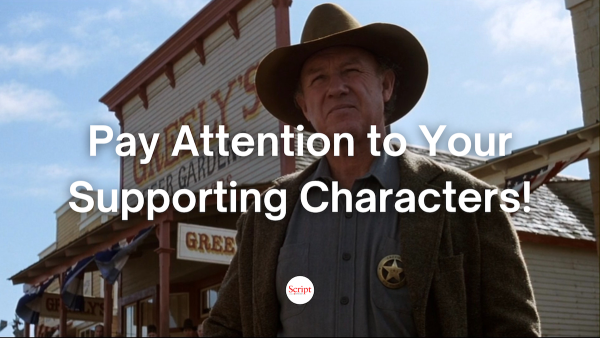Balls of Steel™: You Are Your Words
Every life experience, every emotion we’ve felt, and every person who touched our lives is in our words. See how to keep it real in your writing.
My best friend, who was also my partner in both writing and Impasse Productions, suddenly and tragically died last week. While Tom's passing may seem irrelevant to a screenwriting column, it isn’t, for he brainstormed many of my Balls of Steel columns with me. He taught me about life and writing, and in doing so, also taught every one of my readers.
Every person in your life affects your writing, your stories, and your creativity. We write what we know. By that, I don’t mean all of our stories are nonfiction memoirs, but every life experience, every emotion we’ve felt, and every person who touched our lives is in our words.
You’ll often hear someone sarcastically say, “She’s a character.” And she is. Everyone is. I’m somewhat famous for my coffeehouse voyeurism. It’s where I learn about human behavior – observing strangers and soaking in their mannerisms to make my fictional characters more interesting and realistic.
But don’t just look at strangers for motivation. Look at the people who are in your life now as well as people from your past. Your first love, your nastiest boss, the guy who looked at you funny at the gas station this morning. Each and every person we come in contact with leaves a footprint on us. If we let them, they can leave footprints on your characters, making them richer.
As you draw from people in your life to enrich your characters, consider going a step farther and using the life lessons you have learned from them to bolster the themes in your stories. Each person we encounter brings us life lessons. Some people teach us about beauty and joy. Some expose us to pain and loss. Some do both. And we live through it. And then we write about it. After all, that is what theme is – the message we want to leave the viewer or reader with. Draw from those who taught you the lessons that changed you.
I don’t know about you, but I want every single person who reads my work to keep thinking and mulling and stewing after they've put my article or script down. I want to leave a footprint on them with my words. The only way I know how to do this is to kick them in the gut with my own personal emotions.
I get countless emails, asking how I’m able to open myself up so publicly and share both my pain and happiness with my Twitter followers and in my blog posts.
To that, I simply say, “How can I not?”
Life is short. Breathe it in. Feel it. Share it. Use it, both the good and the bad. Love with reckless abandon. Slather butter on that warm piece of bread. Taste it. Taste life. Then bring all of that to your readers.
I have spent this week feeling every ounce of the pain of losing my dearest friend, letting it flow through my body and soul, for I am confident someday that pain will be something I draw upon to write. Even in death, he will make my words better.
Tom was in my life for too short a time, but he had a profound impact on me as both a writer and a human being. My words are better because of him, and my life, though completely different without him, is still better because of the love, support, and wisdom he shared with me.
His last words to me on the morning of his death were, “Be all you can be.”
I share this with you, because I want you all to do the same. Be all you can be in every aspect of your life, both personally and professionally. Make every day count. Make every word count. Make everything you write the best it can be. You can only do that by keeping it real and not hiding from pain. Confront hard times head on, let them flow through you, and watch them leave you, changed but stronger.
Be all you can be. I will forever live by those words. I hope you do, too.
Dedicated to Thomas M. Glavin, an irreplaceable man of honor who loved his family and country.
More articles by Jeanne Veillette Bowerman:
Jeanne Veillette Bowerman is a Senior Executive at Pipeline Media Group and Book Pipeline, Editor-in-Chief of Pipeline Artists, Director of Symposium—a year-round conference in the arts, co-host "Reckless Creatives" podcast, partner at Fringe Press, former Editor-in-Chief of Script magazine and a former Senior Editor at Writer's Digest. Recognized as one of the "Top 10 Most Influential Screenwriting Bloggers," her "Balls of Steel" column was selected as recommended reading by Universal Writers Program. A compilation of her articles is now available at The Writers Store—Balls of Steel: The Screenwriter's Mindset. She is also Co-Founder and moderator of X's weekly screenwriters’ chat, #Scriptchat, and wrote the narrative adaptation of the Pulitzer Prize-winning book, Slavery by Another Name, with its author, Douglas A. Blackmon, former senior national correspondent of The Wall Street Journal. More information can be found on her website. X: @jeannevb | IG/Threads: @jeannevb_ | BlueSky: @jeannevb.bsky.social







